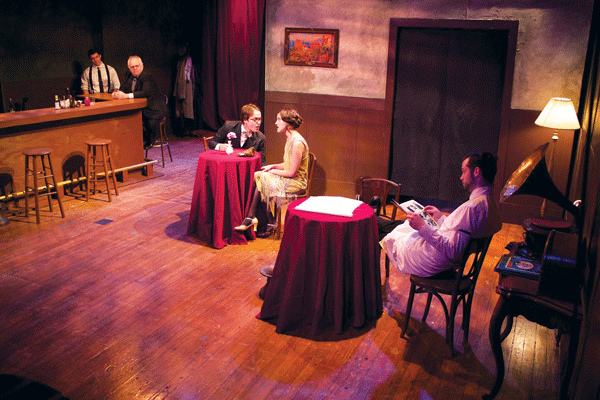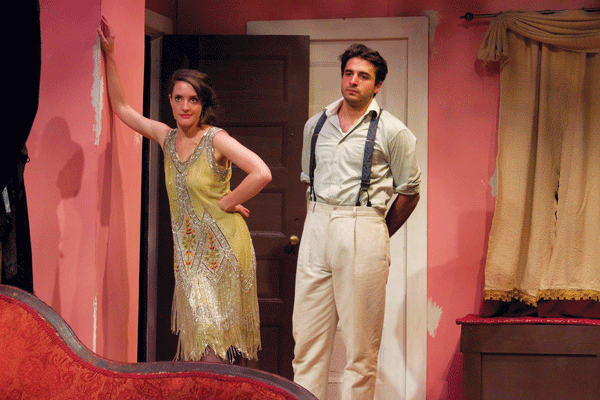
BY TRAV S.D. (travsd.wordpress.com) | It’s interesting to speculate what the history of American theatre would have been if the movie industry in Hollywood had not come along to lure away some of its best talents.
A primary case in point is writer-director-producer Preston Sturges, best known today for his unprecedented (and never repeated) run of stunningly brilliant screwball comedies, encompassing “The Great McGinty” (1940), “Christmas in July” (1940), “The Lady Eve” (1941), “Sullivan’s Travels” (1941), “The Palm Beach Story” (1942), “The Miracle of Morgan’s Creek” (1944) and “Hail, the Conquering Hero” (1944).
Sturges had begun as a Broadway playwright whose early success was so impressive he was whisked to the west coast almost from the start, spending a decade as one of the industry’s most prolific and reliable screenwriters before being allowed to sit in the director’s chair. His most notable screenwriting effort from this early phase was 1933’s “The Power and the Glory.” said to have been a major influence on Orson Welles’ “Citizen Kane.”
Attic Theater Company hits the notes and fills them with joy
But the script that started it all was Sturges’ second play, “Strictly Dishonorable” — which ran on Broadway for 16 months (1929-1931) and was adapted into a 1931 movie starring Paul Lukas and Sidney Fox (and again, in 1951, with Ezio Pinza and Janet Leigh.
Reportedly written in only six days, “Strictly Dishonorable” possesses all the themes in embryo we would later associate with Sturges’ classics: sexual danger, class tension, sympathy for the “little guy” and a hero who is living a lie. Further, it is populated with a range of comedy types we recognize from his later work: a comical Italian bartender, an Irish cop, a crooked judge, an uptight WASP and a girl who is in the mood for love. The latter is at the center of “Strictly Dishonorable.”
THEATER | STRICTLY DISHONORABLE
Written by Preston Sturges
Directed by Laura Braza
Presented by the Attic Theater Company
Through August 10
Tues.–Sun. at 7 p.m. | Sat. at 2 p.m.
At The Flea Theater
41 White St. (btw. Broadway & Church)
For Tickets ($25), theattictheaterco.com
An impoverished Mississippi debutante wanders into a New York speakeasy one night with her controlling, asinine fiancé. There, she falls in love with a famous opera singer (a habitual seducer), breaks up with her boyfriend, and agrees to spend the night on the singer’s couch. The big question on everyone’s minds: “Will she or won’t she [have sex]?” In 1931, sex out of wedlock was almost universally frowned upon, at least officially. To live “in sin” could mean a woman’s downfall. Sturges’ script is a rich mix of French farce, with an Ibsen/Shaw style problem play, and (in the first act) the kind of “saloon theatre” we associate with O’Neill and Saroyan.

The Attic Theater Company’s pitch-perfect production of “Strictly Dishonorable” (now playing at The Flea through August 10) manages to hit all the play’s diverse notes and fill it with joy and life besides. Director Laura Braza not only comprehends the play’s themes, but in practice proves that she understands one of Sturges’ primary geniuses: the undeniable fact that in theatre (and radio, television and film), casting is everything.
As Isabelle, the wayward Belle, Keilly McQuail is an absolute find, surfing the comedy to be found in Sturges’ lines like the biggest of Big Kahunas. Her mastery of comic timing is riveting. It’s a quality we normally associate with more seasoned, older actors. Her skills could keep McQuail working for decades. By contrast, Michael Labbadia (as the opera singer) gives a performance that is as much about heart as it is about craft, putting us in direct touch with the romantic elements of Sturges’ vision.
This is a script that comes within a hair’s breadth of tragedy, and Labbadia’s performance is the element that keeps us in mind of that fact. As the loveable, meddling Judge Dempsey, John Robert Tillotson could be straight from a Sturges film himself. On the other hand, Thomas Christopher Matthews, in the thankless role as the weaselly, unlikable fiancé, seems less like a Sturges actor than, say, Rob Lowe in the Peter Bogdonovich Sturges tribute “Illegally Yours.” (While the performances in this show were uniformly first-rate, Matthews and some of the other younger actors in the cast need to get over to the barber shop, tout suite. Show up to the stock exchange or the station house in 1931 with hair halfway down your neck, or, for pity’s sake, a beard, gang, and you would cause an absolute commotion — or at the very least, an eruption of ridicule.)
Overall, this ensemble is riveting to watch, and it’s at the level of playing we embrace this production the most. Yet as moving as Labbadia is towards the end of the play, I do think he and director Braza have missed a major aspect of the earlier beats. Count Ruvo is a Casanova, an “operator.” He has designs on Isabelle’s “virtue,” and therein lies the play’s arc — as his love for the girl is so great, he makes the epic journey all the way to gentlemanliness. We need to see the devil in him before he becomes an angel. But this is the kind of thing that occurs to one on the way home from the theatre. While you’re there, you’ll simply be transfixed by the world made by Sturges, Braza and her cast.
Trav S.D. has been producing the American Vaudeville Theatre since 1995, and periodically trots it out in new incarnations. Stay in the loop at travsd.wordpress.com, and also catch up with him on Twitter, Facebook, YouTube, et al. His books include “No Applause, Just Throw Money: The Book That Made Vaudeville Famous” and “Chain of Fools: Silent Comedy and its Legacies from Nickelodeons to YouTube.”

















